Home | Category: Ramadan and Muslim Holidays
RAMADAN AND THE NEW MOON
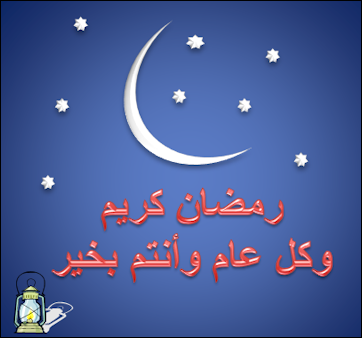 Ramadan is the ninth month on the Muslim calendar. The fast officially start the first day after the sighting of a crescent moon, marking the beginning of a new lunar month. Shiites and Sunni sometimes disagree over the starting time for Ramadan. It is not unusual for the fast to begin two days later for Shiites.
Ramadan is the ninth month on the Muslim calendar. The fast officially start the first day after the sighting of a crescent moon, marking the beginning of a new lunar month. Shiites and Sunni sometimes disagree over the starting time for Ramadan. It is not unusual for the fast to begin two days later for Shiites.
In the Qur’an, Muhammad said: "Do not fast until you see the new moon, and do not break the fast until you see it; but when it is hidden from you [by clouds or mist] give it its full measure." This means that the fast of Ramadan might begin a day later in town with cloudy weather than one where skies are clear. There is also a stipulation that a "sane person" has to spot the moon.
For many Ramadan starts when the new moon is seen in Mecca. The new moon is usually sighted there on the first day of the lunar month because the weather is generally not cloudy in Saudi Arabia. When it isn't, the new moon is usually sighted the next day and the Ramadan and and the feast that follows began a day later. In 2004, for example, a new moon was not spotted in Saudi Arabia and many other places in the Middle East and the start of Ramadan was delayed one day.
A cannon is often fired each day to announce the rising or setting sun. Sometimes its also fired two hours before sunset to give people time to prepare the evening meal.
See Separate Articles: MUSLIM CALENDAR AND HOLIDAYS africame.factsanddetails.com ; RAMADAN: MEANINGS, PRACTICES AND EXPECTATIONS africame.factsanddetails.com ; RAMADAN RULES africame.factsanddetails.com ; FASTING AND EATING DURING RAMADAN africame.factsanddetails.com ; EID AL-FITR, THE CELEBRATION MARKING THE END OF RAMADAN africame.factsanddetails.com
Websites and Resources: Islam IslamOnline islamonline.net ; Institute for Social Policy and Understanding ispu.org; Islam.com islam.com ; Islamic City islamicity.com ; BBC article bbc.co.uk/religion/religions/islam ; University of Southern California Compendium of Muslim Texts web.archive.org ; Encyclopædia Britannica article on Islam britannica.com ; Islam at Project Gutenberg gutenberg.org ; Muslims: PBS Frontline documentary pbs.org frontline
RECOMMENDED BOOKS:
“A Guide to Ramadan and Fasting” by Musharaf Hussain and Abia Afsar-Siddiqui Amazon.com ;
“Islam's Lunisolar Calendar and the Celestial Year-Clock” by Mark Andrew Brustman Amazon.com ;
“Time in Early Modern Islam: Calendar, Ceremony, and Chronology in the Safavid, Mughal and Ottoman Empires” by Stephen P. Blake Amazon.com ;
“Ramadan Reflections: A Guided Journal” by Aliyah Umm Raiyaan Amazon.com ;
“The Fiqh of Fasting the Month of Ramadan” by Numerous Scholars of Saudi Amazon.com ;
“A Guide to Ramadan and Fasting” by Musharaf Hussain and Abia Afsar-Siddiqui Amazon.com ;
“Ramadan and Fasting - Rewards Unlimited” by IqraSense Amazon.com ;
“Ramadan Fasting Recipes for Muslims” by Imam Zakariya Jameel Amazon.com ;
“Fasting Ramadan While Incarcerated” by Tayba Foundation Amazon.com ;
“Islam Beliefs and Teachings” by Ghulam Sarwar Amazon.com ;
“Islam Explained: A Short Introduction to History, Teachings, and Culture” by Ahmad Rashid Salim Amazon.com ;
“No God but God” by Reza Aslan Amazon.com ;
“Welcome to Islam: A Step-by-Step Guide for New Muslims” by Mustafa Umar Amazon.com
Moon Sighting the Start of Ramadan
Ramadan is the ninth month of the Islamic calendar. As with all months in the Islamic calendar, it commences on the sighting of the new moon. Some countries use astronomical calculations and observatories, while others rely on the naked eye alone, leading sometimes to different starting times. There can be confusion and disagreement over the starting date of Ramadan and Muslims often start and end Ramadan on slightly different days.
In 2016, religious authorities in most Middle Eastern countries announced the new moon of Ramadan was spotted on Sunday evening. The official sighting was announced in Saudi Arabia. Indonesia, the world's most populous Muslim country, said Muslims there would begin fasting on Monday, as did Muslims in Singapore, Yemen, Lebanon, Syria, Qatar, Kuwait, Jordan, Egypt, the United Arab Emirates, Afghanistan and the Palestinian territories, among others. Iran and Pakistan announced their moon sightings independently and the fast began there at different times. [Source: Al Jazeera, June 6, 2016]
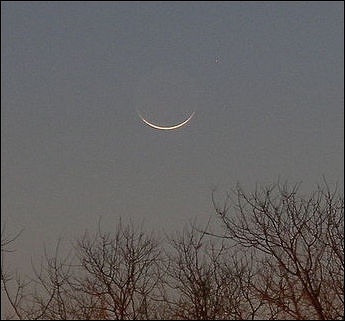
crescent moon
On the sighting in 2017, Al Jazeera reported: “Saudi Arabia's High Judicial Court has announced that, based on confirmed sightings of Ramadan's new moon crescent, the first day of Ramadan 1438 fasting will be Saturday, May 27. Saturday was confirmed the first day of Ramadan in 33 other countries also, whereas Bangladesh, Pakistan, India and Shia Muslims in Iraq declared Sunday May 28 to be their first day of Ramadan. Turkey and Muslim communities in America, Europe and Australia previously announced they would observe Ramadan fasting from May 27, based on astronomic calculations. [Source:Al Jazeera, May 27, 2017]
According to the BBC: “Sighting in each country: “Some Muslims believe that a new moon sighting from their individual country marks the start of Ramadan. One argument for accepting this is that Islam is regarded as a way of life for all people. Choosing a local sighting includes those who do not have access to technology or fast communication. It's argued that unity within a known geographic location is more important than celebrating Ramadan with people who live in another country or continent. |::|
“Sighting in Saudi Arabia: Other Muslims believe that the sighting of the new moon from Saudi Arabia marks the beginning of Ramadan. They believe this unifies all Muslims, as well as carrying on the tradition of the Prophet Muhammad. |::|
“Technology: Some Muslims believe that technology should be used to mark the true date. In 2006, the Fiqh Council of North America decided they will no longer use naked eye sightings of the moon, but will use astronomical calculations instead to determine the start of Ramadan. Not all Muslims agree with this approach. |::|
"Ramadan Mubarak" and "Ramadan Kareem" are common greetings exchanged in this occasion, wishing the recipient a blessed and generous Ramadan. Some Muslims — often children under their parents supervision — look at theodolites — precision instruments for measuring angles in the horizontal and vertical planes used mainly for surveying — to determine the sighting of the new moon to mark the start of Ramadan.
Confusion Over When Ramadan Starts
According to the BBC: “ Since the month is full of blessings and marks the beginning of fasting, or sawm, accuracy is very important. Since Muslims live all over the world, but Islam started in what is now known as Saudi Arabia, they may not agree as to which country’s first moon sighting marks the start of the month. |::|
Jennifer Williams wrote in Vox: “The beginning of each new month in the Islamic calendar starts on the new moon. Which means the month of Ramadan starts on the new moon. Simple enough, right? Wrong. Back in Muhammad's day, in sixth-century Arabia, astronomical calculations weren't as precise as they are today, so people went by what they could see with the naked eye. [Source: Jennifer Williams, Vox, June 7, 2016 ^/^]
“Since the new moon isn't actually super visible in the night sky. Muslims traditionally waited to start fasting until the small sliver of crescent moon became visible. There's even a saying attributed to the Prophet Muhammad about waiting to start the fast until you see the crescent. (Some people think this is why the star and crescent is the symbol of Islam, but the crescent was used as a symbol long before Islam.) ^/^
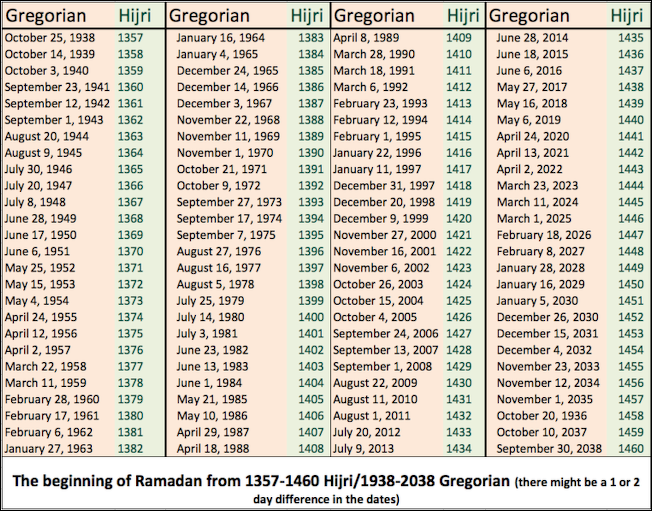
dates for the first day of Ramadan from 1938 to 2037
“This method was a bit messy, though, since things like clouds or just the difficulty of spotting the moon in some locations often led to different groups starting their fast on separate days, even within the same country. Each community, village, or even mosque within the village might send its own guy out to look for the crescent, with rival groups arguing over whether the other guy really saw it or not. Today, however, we have precise scientific calculations that tell us exactly when the new moon begins, and we don't need to wait until someone spots a tiny crescent in the sky. (In fact, according to the Oxford Dictionary of Islam, "The need to determine the precise appearance of the hilal [crescent moon] was one of the inducements for Muslim scholars to study astronomy.") ^/^
“So, problem solved! Except that some Muslim scholars believe we should still wait until the slight crescent moon is visible in the night sky, because that's what Muhammad said to do and that's the way we've always done it. Others argue that Islam has a strong tradition of reason, knowledge, and science, and that if Muhammad were around today he'd choose the more precise scientific calculations over sending the guy at the mosque with the best eyesight outside to squint at the night sky. ^/^
“To make things even more fun, some argue that the whole world should just follow the official moon-sighting decrees of Saudi Arabia, the birthplace of Islam and the location of its holiest sites. But not everyone thinks that's such a swell idea — especially rival countries like Pakistan and Iran, which balk at the idea of treating Saudi Arabia as the ultimate authority on anything having to do with Islam. All this means that each year Muslims around the world get to experience the delightful lunacy of "moon-sighting fighting." Indeed, it's such a familiar feature of Ramadan that there are memes about it: Yes, Muslims use this meme too. There's really no escaping it.”
World's Biggest Clock Launches 2010 Ramadan in Mecca
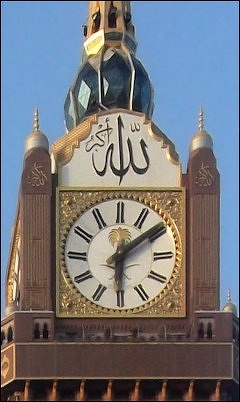
giant Mecca clock
In August 2010, the world's biggest clock began ticking in Mecca at the start of the fasting month of Ramadan, amid hopes by Saudi Arabia it will become the Muslim world’s official timekeeper. Asma Alsharif of Reuters wrote: “The Mecca Clock, which Riyadh says is the world’s largest, has four faces measuring 43 meters in diameter. It sits 400 meters up what will be the world’s second-tallest skyscraper and largest hotel, overlooking the city’s Holy Grand Mosque, which Muslims around the world turn to five times a day for prayer. “The Holy Mecca Clock started with the order of King Abdullah bin Abdulaziz Al-Saud ... one minute after 12 a.m. this morning, the first day of the holy month of Ramadan,” Saudi state news agency SPA said. [Source: Asma Alsharif, Reuters, August 12, 2010 -]
“Over 90 million pieces of colored glass mosaic embellish the sides of the clock, which has four faces each bearing a large inscription of the name “Allah.” It is visible from all corners of the city, the state news agency said. The clock tower is the landmark feature of the seven-tower King Abdulaziz Endowment hotel complex, being built by the private Saudi Binladen Group, which will have the largest floor area of any building in the world when it is complete. Local media have said the clock tower project cost $3 billion. -
“The clock is positioned on a 601-meter tower, which will become the second tallest inhabited building in the world when it is completed in three months’ time. “Because it based in front of the holy mosque the whole Islamic world will refer to Mecca time instead of Greenwich. The Mecca clock will become a symbol to all Muslims,” said Hashim Adnan, a resident of nearby Jeddah who frequently visits Mecca. -
The project is part of efforts to modernize the old city and make it more capable of catering to pilgrims.While many in Saudi Arabia are celebrating the clock tower’s launch, some Mecca visitors are critical of how it will affect the ambiance of the Prophet Muhammad’s birthplace. The complex is built on the land once occupied by an Ottoman fortress. “I think they are trying to do a lot of luxurious development around the Grand Mosque which is taking away from the spiritual atmosphere of the place, making it more modern,” said Lina Edris, a frequent visitor to Mecca. “The clock tower is higher than the minarets of the Grand Mosque, which will take attention away from the mosque even though it is obvious the mosque is more important,” she added.” -
Seasonal Timing of Ramadan
Jennifer Williams wrote in Vox: “ For religious matters, Muslims follow a lunar calendar — that is, one based on the phases of the moon — whose 12 months add up to approximately 354 days. That's 11 days shorter than the 365 days of the standard Gregorian calendar. Therefore, the Islamic lunar calendar moves backward approximately 11 days each year in relation to the regular Gregorian calendar. So that means that the first day of the month of Ramadan, which is the ninth month of the Islamic lunar calendar, moves backward by about 11 days each year. [Source: Jennifer Williams, Vox, June 7, 2016 ^/^]
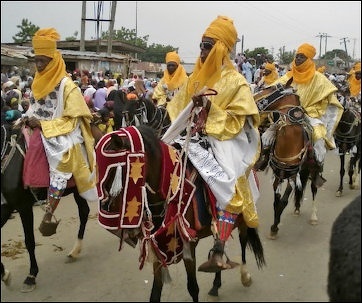
Durba, a Ramadan festival in Nigeria
“This has a large impact on how people experience Ramadan from year to year. When Ramadan falls in the winter, it's much easier to fast: the days are shorter, which means you don't have to fast as long, and it's colder out, so not being able to drink water all day isn't as big of a deal, because you're not sweating as much. Conversely, when Ramadan falls in the summer (as it has every year since I converted, because of course), fasting can be brutal. In many Muslim countries in the Middle East and Africa, summer temperatures can reach levels usually reserved for the deepest bowels of hell. ^/^
“And in some northern European countries such as Iceland, Norway, and Sweden (where, yes, there are Muslims), fasting can last an average of 20 hours or more in the summer. (And in a few places above the Arctic Circle, the sun never actually sets in the summer. In these cases, Muslim religious authorities have decreed that Muslims can either fast along with the closest Muslim country or fast along with Mecca, Saudi Arabia.)” ^/^
Ramadan in the Land of Midnight Sun
Reporting from northern Sweden in 2014, Cajsa Wikstrom wrote: “An estimated 700 Muslims are spending Ramadan in the mining town of Kiruna, located 145km north of the Arctic Circle and surrounded by snowcapped mountains throughout the summer. Many of them are recent asylum seekers, sent to Kiruna while their claims are processed. The sun stays up around the clock from May 28-July 16, which constitutes half of the fasting period this year. "I started Ramadan by having suhoor with the sun shining in my eyes at 3:30 in the morning," said Ghassan Alankar from Syria, referring to the meal just before dawn. "I put double curtains in my room and still, there's light when I'm going to sleep." [Source: Cajsa Wikstrom, July 7, 2014 ++]
“Since there is no central authority in Sunni Islam that could issue a definite religious ruling, or fatwa, Muslims in the north are using at least four different timetables to break the fast. Alankar sticks to Mecca time, Saudi Arabia, "because it's the birthplace of Islam". But he is worried about whether his fast will be accepted by God. "I'm not sure I'm doing the right thing," said Alankar, who arrived in Kiruna seven months ago after a hazardous journey via Lebanon, Turkey, and Greece. "Only when I'm in God's house, if I make it to heaven, I will know." ++
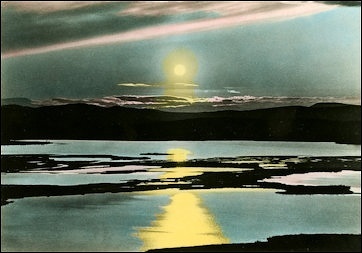
midnight sun in Sweden
“A majority of those who fast in Kiruna follow the timings of the capital Stockholm, 1,240km further south, after being advised by the European Council of Fatwa and Research (ECFR), a Dublin-based private foundation composed of Islamic clerics. "In Stockholm, there's day and night," Hussein Halawa, secretary-general of the council, told Al Jazeera, explaining the decision. He was personally invited to northern Sweden from Dublin this year to experience the lengthy daylight and give advice. Idris Abdulwhab, from Eritrea, follows the ECFR fatwa, which means his longest period of fasting will be 20 hours. "Zero, 15, 25 or 45 hours, it doesn't matter as long as you believe in what you're doing," he said. "But we're human beings; of course it's hard sometimes."” ++
In 2015, AFP reported: “Muslims in the Nordic region can expect new guidelines for coping with a sun that never sets ahead of the holy fasting month of Ramadan, a Swedish Muslim association said. Ramadan begins on June 18 this year — three days before the longest day of the year — when the sun blazes around the clock above the Arctic Circle and only sets for a few hours further south, presenting a problem for Muslims who are meant to fast until sunset. "We've got two difficult questions, not just when you can break the fast in the north but also when you should start fasting," Muhammad Kharraki, a spokesman for Sweden's Islamic Association, told AFP. "You're supposed to start fasting before the sun rises, at dawn. But there is no real dawn in the summer months in Stockholm." [Source: AFP, June 10, 2015]
In previous years Muslims in sub-Arctic towns like Kiruna were advised to break their fast at the same time as people in the south but a meeting of Swedish and European imams in northern Sweden this week recommended a new approach. "Now you should go by the last time the sun clearly set and rose," said Kharraki, adding that detailed guidelines were still being worked out and could also involve breaking the fast in the early evening to be more in line with the rest of the world.
The new rules being drawn up by a pan-European association — the European Council for Fatwa and Research — are expected to apply across the continent and will include advice on situations where Muslims can break the fast to avoid collapsing from lack of food and water. "People can try to fast for 19 hours but not handle it. That's not the idea... If you don't manage to do your work or stay on your feet, then it's time to break the fast," said Kharraki.
Image Sources: Wikimedia Commons
Text Sources: Internet Islamic History Sourcebook: sourcebooks.fordham.edu ; Arab News, Jeddah; “Islam, a Short History” by Karen Armstrong; “A History of the Arab Peoples” by Albert Hourani (Faber and Faber, 1991); “World Religions” edited by Geoffrey Parrinder (Facts on File Publications, New York); “Encyclopedia of the World’s Religions” edited by R.C. Zaehner (Barnes & Noble Books, 1959); Metropolitan Museum of Art, Encyclopedia.com, National Geographic, BBC, New York Times, Washington Post, Los Angeles Times, Smithsonian magazine, The Guardian, Al Jazeera, The New Yorker, Time, Newsweek, Reuters, Associated Press, AFP, Library of Congress and various books and other publications.
Last updated April 2024
